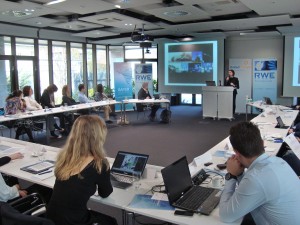
Over the past few years, the world around Europe has become much more dangerous. What a contrast to the profound optimism of the 1990s! Of course, people in their late 20s or early 30s can’t remember the years just following the collapse of the Soviet Union and end of the division of Europe. But they do realise that today, with Russia’s armed incursion into Ukraine conflict and the threat of unrest and terrorism from across the Mediterranean, Europe’s security is under threat again.
Is Europe doing everything possible and necessary to counter those threats? How are our people, our government and the European institutions reacting to the changes in the world surrounding us? Is our sense of solidarity strong enough to allow us to face the challenges together?
Those were the questions that 21 young Europeans representing a wide range of nationalities and professions discussed during a weekend seminar from May 20-22 in the Czech capital Prague. The topic of United Europe’s latest Young Professionals Seminar was “Security and Solidarity in Europe”. The debate was sobering, but it also reflected the younger generation’s determination to defend Europe, its values and its way of life.
Many thanks to RWE and Airbus
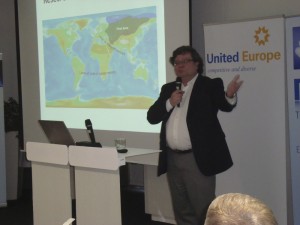
Alexandr Vondra, a former Czech defence and foreign minister, set the tone in his opening speech. This former dissident and close friend of Vaclav Havel gave a sweeping historic overview, dwelling in particular on relations between the West and and an increasingly aggressive Russia. “Ukraine is an important battleground, to put it metaphorically,” he said.
In this conflict, the West was vulnerable because it was not willing to undergo sacrifices. Also, the United States President Barack Obama provided little leadership. “Europe has been left to fix the European neighbourhood alone,” Vondra said. “Today, I am much more sceptical than I was over the last 25 years.”
This Young Professionals Seminar – the third such event that United Europe’s Managing Directors Bettina Vestring and Christoph Riess have organised – took place at the Czech headquarters of the energy company RWE. The conference rooms were spacious and light-filled, the hospitality warm. RWE was a wonderful host and sponsor, but equal thanks are due Airbus, a company with a truly European profile, which made the Prague seminar possible through their generous support Both companies also contributed fantastic speakers. But that’s for later.
Thinking about Ukraine
In the meantime, the first day of the Prague seminar continued with the first set of short contributions from theparticipants. Codin Popescu spoke about the changes that Europe can bring to a poor and badly governed country like Ukraine. In his presentation, Popescu used the example of his home country Romania to explain what an enormous difference EU membership has made in the fight against corruption, for example.
The next speaker, Martin Haburaj from Slovakia but working in Prague, also spoke about Ukraine. Without a stronger European reaction, he warned, Russia’s illegal annexation of Crimea would turn into a precedent. Sofia Lemos, a young art curator from Portugal, spoke next and told the sad tale of an arts centre in Donetsk which was occupied and destroyed by armed separatists in June of last year.
Anna Prokofieva who was deeply engaged in the opposition movement in Belarus, explained how the Ukraine crisis has affected her home country. Anna Vavilova, who emigrated from St Petersburg to Finland five years ago, gave a very lively description of the mood in Russia and of how hard line and anti-Western it has become.
What relations with Russia?
Finally, Christoph Kremer spoke about the difficulties of business relations with Russia under the present circumstances. Selling products in Russia is becoming very difficult because of the fall in the rouble. Opening production facilities would be a possible solution from a business point of view, but has to be ruled out for political reasons.
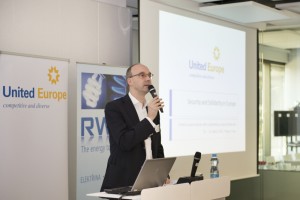
The day’s work ended with a speech from Martin Herrmann, CEO and Chairman of RWE East, who put together some very interesting pictures and graphics describing energy security as an essential precondition for growth and economic prosperity.
Yet every energy source, Herrmann said, has drawbacks. Oil and gas are politically vulnerable. Even nuclear energy is dependent on imports of uranium from Russia. Expansion of solar and wind energy presents a major challenge to electricity grid operations. “Energy is more affected by politics than ever,” Herrmann said. “What we need is diversification of supplies and sources as well as of technologies.”
How the Euro crisis is testing solidarity
Saturday morning started with the next round of short contributions from participants which centred on the theme of solidarity. Lucilene Veira Lunes from Spain began with asking how Europe could turn the euro crisis into opportunities. Maria Belén Tellez, also Spanish, spoke about how corruption destroys solidarity. The euro crisis, she added, had made people much more aware of this cancer affecting society.
Viktor Kovalczuk explained why Hungary, his country of origin, and other central European countries did not want to join the Euro for now. But this shouldn’t be seen as unwillingness to be part of European integration and solidarity, he added.
The rising numbers of refugees seeking to get into Europe presents yet another challenge to solidarity. Liveris Vouropoulos spoke of the huge burden that refugees present to Greece, and how they are treated even worse under Greece’s new left-wing government than before. Lenka Keriova gave the example of her home country of Slovakia where foreigners only make up for a tiny percentage of the population.
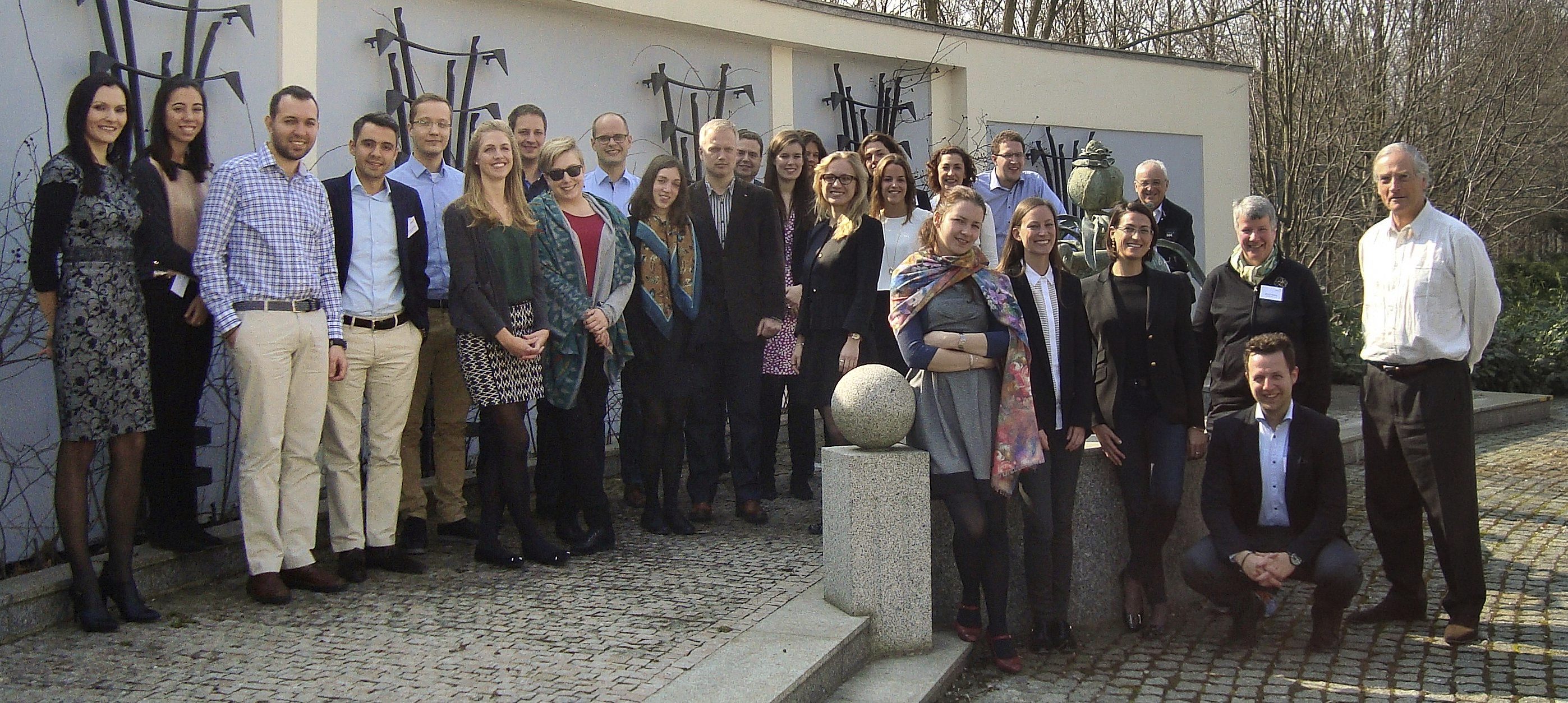
The illusion of peace
As a theatre manager from Warsaw, Joanna Nawrocka talked about what theatre can achieve to create relationships between people. “Theatre doesn’t create solidarity, people do,” she said. She then explained about improvisation theatre where the call of “new choice” heralds a new act. Europe, Nawrocka added, should more often think in terms of “new choice.” This first block was followed by an intensive discussion mainly focusing on refugees.
Work continued with a presentation by Jana Rosenmann, Head of Strategy at Airbus Defence, who flew in for the Saturday morning session to speak about European security and defence policy. After the end of the Cold War, European countries had massively cut military spending. “We had a bit of the illusion of peace,” Rosenmann said. “How do we convince Europeans that defence matters and that we cannot always rely on the US?”
The need for a stronger European defence agency
Today, Europe was directly threatened by a number of security risks: a very aggressive Russia; new issues of cyber war, disinformation and clandestine forces; the Islamic state attracting thousands of foreign fighters; and the enormous increase in the number of refugees coming to Europe. Rosenmann also spoke about the changes in technology. Commercial technology available to everybody, as in the example of 3D printers, was rapidly overtaking military technology.
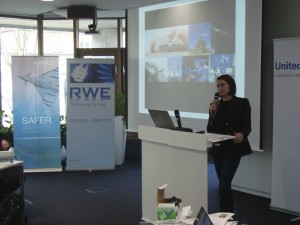
Most importantly, Europe was handicapped by a lack of consensus on key foreign and security issues, Rosenmann said. “The answer is to create a closer working relationship between defence industries and politics and create a stronger European defence agency,” the Head of Strategy for Airbus Defence concluded.
Working groups on solidarity
The morning’s discussions continued in the format of smaller working groups. Each of the three groups looked at the issue of solidarity in Europe; and each ended with conclusions that were surprisingly similar. Solidarity, Claudia Schmidt said, wasn’t a single picture, but a puzzle consisting of many parts. “Do we have the economic and financial strength to show solidarity, and do we have the interest to do so?” Schmidt said. “Solidarity is a combination of responsibility and interest.”
The second working group concentrated on cohesion in Europe. In terms of leadership, this meant focusing on political education, communicating a vision and bringing about agreement, Anna Vavilova said. In terms of communications, it was important to look at Europe as a brand that one would want to identify with. In terms of creating trust, it would help to publicise Europe’s success stories.
“We cannot find solutions, but we can identify areas where change can happen,” said Joanna Nawrocka speaking for the third working group. This meant encouraging education and mobility, promoting European ideas, activities and success stories and creating common EU anti-corruption policies.
Selling air planes for scrap
After the working groups, Veikko Kasak started the next block of short contributions which centred on the instruments Europe has at its disposal to underpin its foreign and security policy. Looking back at his career as a soldier and a security consultant in Afghanistan, this Estonian gave a sobering assessment of the West’s achievements.
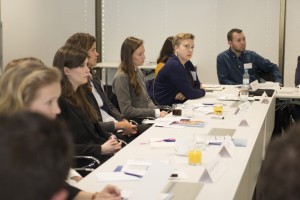
“We managed to take down the regime, but we did not create sustainable institutions,” Kasak said. To illustrate his conclusion, he gave a drastic example. The new Afghan national army, he said, had received 22 aircraft. But instead of being used, they were sold as scrap metal for 26,000 Euro.
Therese Liechtenstein spoke next, explaining the importance of the Organisation for Security and Cooperation in Europe (OSCE) in the Ukraine conflict. Nana Lisa Heider, a young banker from Germany specialised on combatting fraud and enforcing sanctions, analysed the sectoral sanctions that the EU has imposed on Russia.
The threat of Islamist terrorism
“The sanctions are proof that solidarity really exists in Europe”, Heider said. “We can be proud that it is possible to speak with one voice, have a unified purpose and show muscle to Moscow even though we are so fragmented.”
The Prague Young Professionals Seminar had a particularly wide array of topics to discuss. To speak about security and solidarity in Europe means looking not just at the many threats facing Europe, but also at the multitude of factors shaping our response. Yet there are two conflicts today which weigh particularly heavy: the Ukraine crisis and the threat of Islamist terrorism.
Our next speaker was Karim Emile Bitar, Research Director at the French Institute for International and Strategic Affairs. Bitar, of Lebanese and French origin and extremely knowledgeable about the Islamic world, gave a whirlwind overview over the developments in the Middle East, the Arab Spring and the background of young Islamists in Europe.
Trying to explain Europe’s home-grown Islamist terrorists
“It was a tragedy that the Arab Spring happened while the EU was stuck in its financial crisis,” Bitar said. “Europe in 2011 missed a genuine opportunity to support a civil society that was liberal and progressive.”
Bitar passionately warned against the temptation of supporting authoritarian regimes like General Sisi’s rule in Egypt just because they promised to combat Islamism. This was not only morally wrong, it was also politically short-sighted. “There is a vibrant civil society in the Middle East,” he said. “We should not accept the return of authoritarianism in the name of stability. Today’s stability is laying the ground for tomorrow’s instability.
Bitar also spoke at length about young jihadists from Europe who travel to Syria to fight for the Islamic State or who prepare terrorist attacks in Europe. According to studies, 23 percent were converts from Christian or atheist families, he said. Most had a middle or upper class background. “Their profile is not so different from people who join the Red Cross,” he said.
Relations with the Islamic world
Many jihadists knew very little about Islam, Bitar said. For them, religion played a role mainly as an identity marker. “They are lost souls, children of the West who are waging a war against a West in the name of a religion they do not understand,” he said. Possibly the best way of thinking about them was in terms of a cult and its followers.
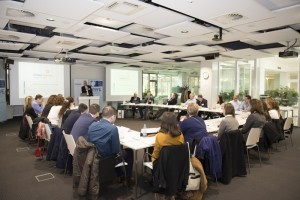
It was an intensive presentation that was followed by an intensive discussion; clearly Islamism constitutes one of the most difficult challenges we will have to face over the next several decades.
Europe’s relations with the Islamic world were also the topic of the next (and last) set of short presentations. Ashkan Kalantary, a German with Iranian roots, spoke about the inconsistencies of the West in dealing with Iran and Saudi-Arabia. Bülbül Selcuk, whose family had emigrated from Turkey to Germany, described the changing relationship between Turkey and Europe and the consequences of a new gas pipeline that is supposed to bring Russian gas to Europe via Turkey.
Crueller? No. More ruthless? Yes
Sandrina Gonçalves Machado from Portugal went back to the young jihadists being recruited in Europe. “Every day, there are young people around Europe joining the Islamic State,” she said. “But what does the Islamic state offer to young people to make them want to give up their lives, their homes, their families? And doesn’t Europe offer any ideals to its young people?”
As the next speaker, Naïs Tirole spoke about the horrifying attacks on the French newspaper Charlie Hebdo in January and the need for a common EU counter terrorism strategy. Georgina Browes, a British EU affairs manager, added a different aspect when she recalled the EU anti-terrorism legislation that had been after the September 11 attacks in the United States. Much of that was done very quickly and through the back door, undermining the EU’s democratic legitimacy.
Finally, Claudia Schmidt, an economist from Germany, spoke about the motivation of terrorists and terrorist followers in Europe. “We are familiar with terrorism,” she said, recalling for instance the leftwing Red Army Faction in Germany and militant separatists in Northern Ireland and the Basque Country. “Is the Islamist terrorism different?” she asked. “Is it crueller? No. More ruthless? Yes.”
New choice!
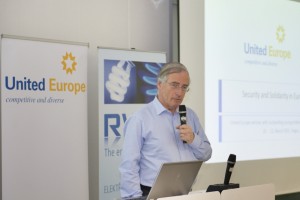
A second session of working groups followed, centring on the question how Europe can find the strength and the unity of purpose to meet the challenges from abroad. The threat of war was actually helping to bring back a sense of purpose to Europe, participants concluded. Again, the working groups concluded that Europe needed to do better in defining its role and communicating it to its citizens.
“Security is an issue that will be with us probably forever,” said Thony Ruys, a founding member of United Europe who acts as mentor to the Young Professionals Seminars, said in his final remarks. “All the outside speakers did not make us much more optimistic, but perhaps they made us more realistic, and that has a value in itself.”
Ruys added that he would wish for more creativity in dealing with the challenges. Europe would do well to emulate the improvisation theatre that Joanna Nawrocka had described in her presentation. “Let’s call ‘new choice!’ more often,” Ruys concluded.


